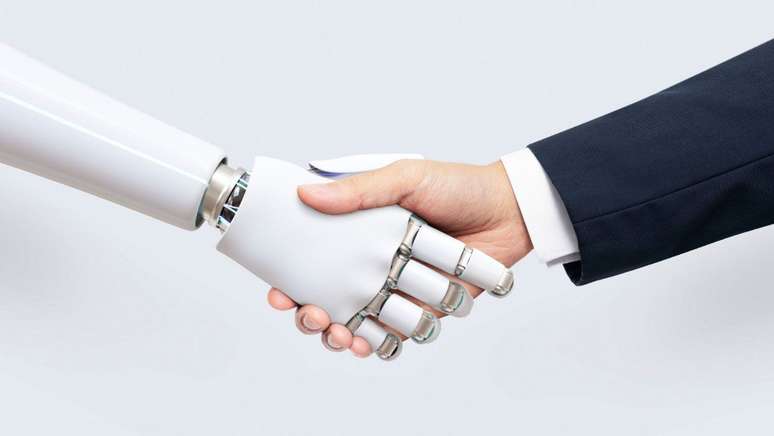PL 2.338/2023 was prepared by a commission of jurists and intends to create rules for the exploitation and inspection of artificial intelligence in Brazil
A commission of jurists has met to draft a bill that regulates the creation of artificial intelligence in Brazil. The proposal was presented by the President of the Senate, Rodrigo Pacheco (PSD/MG), in the form of PL 2.338/2023.
- 5 Big Bing Chat New Things to Beat Google and ChatGPT
- The “Godfather of AI” leaves Google and warns of the dangers of technology
The text is the result of the work of lawyers specialized in the matter and was carried out throughout 2022 – before the topic gained so much visibility. According to Pacheco, the goal is to establish rights to protect people, as well as create governance tools to supervise and inspect activity.
In its 27 pages and 45 articles, the standard brings a number of general concepts to guide the development of AI. For example, it establishes the need to create mechanisms of “transparency, explainability, intelligibility and controllability”.
What is PL 2,338/2023 about?
There is an entire section dedicated to promoting the business, with the definition of a competent authority and a sandbox for experimentation. Nothing can be placed on the market without the due approval of this supervisory body.
Another section is exclusive to dealing with the penalties applied to those who do not comply with the rules. Penalties of up to R$ 50 million and the partial or total suspension of the defaulting company’s activities are envisaged.
An entire chapter was dedicated to protecting the rights of people affected by artificial intelligence systems. The standard forces creators to provide detailed explanations of how decisions are made for these technologies, as well as making it possible to challenge “automated decisions” with a request for human intervention.
The AIs would be monitored before reaching the market
According to the senator’s plan, all AI technology will have to undergo tests managed by the regulatory body. Only those who obtain registration for the exercise, which will determine the “degree of risk offered”, can offer such solutions.
The proposal prohibits the use of AI classified as “excessive risk”, although it does not specify what this means. Technologies that induce behavior harmful to people’s safety or health, such as those that exploit the vulnerabilities of specific groups, such as children or the elderly, will also be banned.
For cases involving the collection and use of personal data, the regulations maintain the devices foreseen by the General Data Protection Law (LGPD). This also applies to those who use the information for purposes other than the AI itself.
For the lawyer Carolina Giovanini, specialist of the Prado Vidigal Advogados, it is essential to reflect on the impacts of the regulation in this moment of evolution. You explain that “premature regulation”, that is done in a very superficial way, could quickly become obsolete.
“Legislative solutions that are too rigid and that do not take into account the different uses of technology can represent an obstacle to the development and improvement of AI, impacting the promotion of innovation in the country”, explained Giovanini. The lawyer believes that Brazil already has rules that could be associated with the use of artificial intelligence, such as the consumer protection code and the civil rights framework for the Internet.
What happens now with PL 2.338/2023?
OR PL 2.338/2023 it was presented to the Federal Senate Plenary and awaits the dispatch to determine next steps. The most probable rite is that it will be sent for analysis by the Senate Committee on Science, Technology, Innovation, Communication and Information Technology (Ccti), but the board of directors could also propose the creation of a special commission.
Today, the country lacks a regulatory framework for the industry, which brings legal uncertainty to those working in AI manufacturing. The lack of standards also creates a gap in the technological part, which prevents institutions and public bodies from creating incentive programs for research and development.
As the topic is on the rise around the world, it would not be surprising if the proposal gets more expedited processing. The regulation of AI standards is a recurring theme among developers in the segment, including requests from OpenAI CEO Sam Altman, creator of ChatGPT, to make it happen quickly.
If Brazil starts discussing the standard, it would be the first country to get into this issue. Not even the United States, where the major companies in the sector are based, have started discussing clear rules on AI.
Trending on Canaltech:
- Why do hospitals give gelatin to patients?
- Motorola Edge 40 launches with big differentials and aggressive pricing
- The new look of WhatsApp for Android starts rolling out to testers
- The penumbral lunar eclipse and flower moon occur this weekend
- The material violates the rules of physics and can lead to a revision of theories
- ChatGPT costs more than BRL 3.5 million per day to operate, analyst says
Source: Terra
Rose James is a Gossipify movie and series reviewer known for her in-depth analysis and unique perspective on the latest releases. With a background in film studies, she provides engaging and informative reviews, and keeps readers up to date with industry trends and emerging talents.







